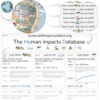Existing consumption and production systems, which use natural resources to meet societal needs for food, shelter, energy and health, are unsustainable. Although researchers from different disciplines have long investigated how these systems can become more sustainable, scientists from socio-technical and socio-environmental research communities are now seeking to join forces.
A new special feature published November 21, in the Proceedings of the National Academy of Sciences (PNAS), which was guest edited by researchers from The University of Manchester, the Institute for Ecological Economy Research (IÖW), and Harvard University, presents new findings about transitions in electricity, food and mobility systems.
These findings synthesize, elaborate and apply research on sustainability transitions, which has progressed significantly over the past decade, generating novel insights about the dynamics of transitions. This research shifts the focus from sustainability goals and targets to the real-world change processes that could help to meet those targets. The special feature contains 15 articles that present new insights on transitions to a wider sustainability science audience, policymakers, and practitioners.
Large-scale, long-term changes of systems needed
“The central challenge of our age is how to make development sustainable—to assure that it advances people’s well-being in the here and now without unfairly constraining the ability of people elsewhere, or in the future, to advance their own well-being,” says William Clark, professor at Harvard University and director of its Sustainability Science Program. “That requires transitions, by which we mean significant large-scale, long-term changes in the actors, institutions, technologies, and resources that make up consumption-production systems.”
The papers in the special feature analyze these changes for electricity, mobility, and food systems. In addition, they address cross-cutting issues such as the destabilization of existing systems, the role of shocks, and the governance of transitions. “This special feature makes three contributions to the pursuit of sustainability: highlighting the importance of multi-level interactions in sustainability transitions, a focus on solutions (innovation), and a deeper and more differentiated analysis of the processes of change,” says Professor Frank Geels.
Core aspects of transitions research: Multi-level interactions, solutions, process of change
“This special feature makes three contributions to the pursuit of sustainability: highlighting the importance of multi-level interactions in sustainability transitions, a focus on solutions (innovation), and a deeper and more differentiated analysis of the processes of change,” explains Frank Geels, professor of sustainability transitions at The University of Manchester.
“It is interesting to see that transitions in the electricity, mobility and food systems are currently unfolding at different speed and depth. This is due to different techno-economic developments and socio-political activities. They have progressed farthest in the electricity system. In the (auto)mobility system they are beginning to unfold, and in food systems they appear to be in early phases.”
The papers demonstrate the multi-dimensional nature of sustainability transition processes which cannot be reduced to purely technological or economic explanations. Instead, they show the importance of understanding sustainability transitions as multi-level, systemic, incomplete, and contested processes, in which innovation plays an essential role that is always shaped by and contributing to social, political, economic, and cultural developments.
Deeper transitions are slower
“One of the important findings from across the special feature is that transitions are often about reconfiguration rather than substitution of existing systems, and that there are tensions between depth and speed of change: the deeper a change, the more difficult and slower it tends to be.
“It is also important to recognize that the governance of transitions is highly political and can be very politicized. There are winners and losers,” states Florian Kern, transitions researcher at the Berlin-based Institute for Ecological Economy Research.
“While recognizing various complexities, the special feature also shows how transition processes can be accelerated and steered in more sustainable directions. This is crucial, because historical transitions were often slow, decade-long processes, while time is pressing for the polycrises of the present.”
More information:
Sustainability transitions in consumption-production systems. www.pnas.org/topic/551
Provided by
University of Manchester
Citation:
Sustainability transitions in energy, mobility, food: Research focus shifts to real-world change processes (2023, November 22)



